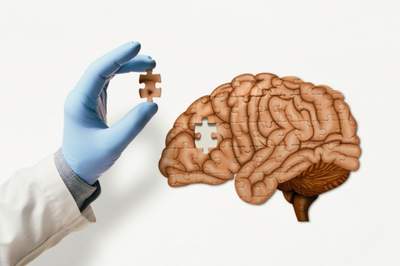Maintaining optimum mental health is crucial as you age. Your brain functions influence your daily life, health, and emotional well-being.
Brain shrinkage is a part of aging. That can lead to changes in your thought processes and memory. You may forget where you placed your glasses, keys, or phone. Why did you walk into that room? Did you take your medications or vitamins today?
Follow along as we explore aging and mental health and what you need to know to keep your mind sharp as you age.
Why Does Mental Health Decrease with Age?
 It is not only the body that changes as we age but also the brain. Many people think of cognitive health as brain health, but there is more to it than that. Factors that can influence brain health include aging, traumatic brain injury (TMI), substance abuse, diseases, depression, stroke, and medical treatments, including radiation.
It is not only the body that changes as we age but also the brain. Many people think of cognitive health as brain health, but there is more to it than that. Factors that can influence brain health include aging, traumatic brain injury (TMI), substance abuse, diseases, depression, stroke, and medical treatments, including radiation.
Brain health encompasses the following:
- Cognitive – thought, learning, processing, memory
- Emotional – interpretation and response to emotions
- Motor – movement and balance
- Tactile – touch, pain, pressure, and temperature
Mental decline is not inevitable – it is not a normal part of aging. Although the brain shrinks as we age, many people never suffer from the consequences of this occurrence. However, more than 20% of adults over 55 may experience some form of mental health issue. The physiological changes that occur in the brain can interfere with crucial functions that affect memory, emotional well-being, and socialization.
Aging can also be difficult as many people deal with losing a loved one, job, or independence. Chronic illness is another area that can take a toll on emotional well-being. These issues can lead to significant depression. Hormone decline plays another role in mental health.
Can Low HGH Levels be a Cause of Mental Health Problems?
Human growth hormone (HGH) deficiency can be a reason for some people to experience mental health problems. HGH works directly on its receptor cells in the brain that influence learning, recall, and emotions. Growth hormone has neuroprotective effects on the brain, promoting neurogenesis, stimulating myelination, and contributing to synaptogenesis.
HGH deficiency causes an increase in cortisol production. The stress hormone cortisol interferes with sleep and further decreases growth hormone production. Increased stress worsens overall health and cognitive decline.
Because human growth hormone also influences how we look, feel, and perform, a decrease in these areas can further increase feelings of depression.
What Mental Problems Can Affect Older Adults?
Mental health issues can manifest in many ways, varying significantly from one person to another. Some of the problems facing older adults include:
- Depression
- Forgetfulness/memory recall
- Difficulty retaining information
- Sleep disturbances
- Inability to perform daily tasks
- Anxiety and the handling of stress
- Ability to make choices
- Hopelessness and isolation
- Obesity
- Slow healing from illness
- Dementia
- Alzheimer’s disease
Changes in mental health can lead to a decline in quality of life.
What Are the Warning Signs of Mental Health Problems?
The following list highlights the most common warning signs to be aware of in aging adults:
- Sleep disturbances
- Mood changes
- Trouble concentrating
- Changes in energy levels
- Anger or irritability
- Feeling stressed or worried
- Changes in appetite
- Physical manifestations such as headache, pain, or digestive issues
- Sadness
- Substance abuse
- Obsessive or compulsive behavior
- Hearing or seeing things that others do not
- Behavior or thoughts that interfere with daily life
- High-risk actions
- Suicidal thoughts
- Withdrawal
- Feeling numb
Knowing these warning signs can help you be aware of changes in mental health for early intervention.
How HGH Therapy Helps to Keep Your Mind Sharp at Any Age
 Many effects of HGH are mediated by insulin growth factor 1 (IGF-1), a hormone secreted by the liver in response to signals from human growth hormone. HGH and IGF-1 decline can impair neuronal excitability and cognition and create changes in synaptic proteins.
Many effects of HGH are mediated by insulin growth factor 1 (IGF-1), a hormone secreted by the liver in response to signals from human growth hormone. HGH and IGF-1 decline can impair neuronal excitability and cognition and create changes in synaptic proteins.
HGH therapy improves signaling to the receptor cells in the brain, providing benefits in areas such as:
- Working memory
- Selective attention
- Planning
- Organization
- Processing speed
In one study of an elderly woman not deficient in growth hormone but with mild cognitive alterations (MCI), HGH therapy resulted in function recovery related to knowledge, memory, and behavior.
Human growth hormone plays a leading role in maintaining healthy cognitive functions. Adults receiving HGH therapy have reported improved concentration, memory recall, processing, and emotional well-being.
Conclusion
Declining mental health is an issue facing adults as they age. Brain shrinkage and hormone changes can influence mental health, yet these issues are manageable with the appropriate diagnosis and treatment.
Hormone testing can determine if changes in hormone production are contributing factors to declining mental health. If so, correcting these concerns at their source through personalized hormone replacement therapy (HRT) is the logical step.
Preventing mental health issues and keeping your mind sharp with HGH therapy helps many people enjoy a better quality of life. We are happy to discuss options with you during a complimentary telephone consultation.


